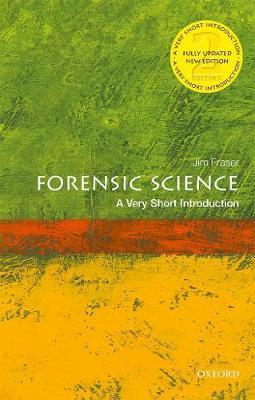Forensic Science: A Very Short Introduction

Forensic Science: A Very Short Introduction
the Stephen Lawrence enquiry and the Madeleine McCann case have attracted enormous media attention and enhanced general interest in this area in recent years.
In this Very Short Introduction, Jim Fraser introduces the concept of forensic science and explains how it is used in the investigation of crime. He begins at the crime scene itself, explaining the principles and processes of crime scene management, and drawing on his own personal experience of high profile cases including, the murder of Rachel Nickell and the unsolved murder of Jill Dando. Fraser explores how forensic scientists work; from the reconstruction of events to laboratory
examinations. He considers the techniques they use, such as fingerprinting, and goes on to highlight the immense impact DNA profiling has had. Providing examples from forensic science cases in the UK, US, and other countries, he considers the techniques and challenges faced around the world. This new edition
has been fully updated to take into account developments in areas such as DNA analysis and drug analysis, and the growing field of digital forensics. Topical areas explored include the growing significance of cognitive bias in forensic science, and recent research that raises doubts about the validity of some forensic techniques.
ABOUT THE SERIES:
The Very Short Introductions series from Oxford University Press contains hundreds of titles in almost every subject area. These pocket-sized books are the perfect way to get ahead in a new subject quickly. Our expert authors combine facts, analysis, perspective, new ideas, and enthusiasm to make interesting and challenging topics highly readable.
PRP: 80.54 Lei
Acesta este Prețul Recomandat de Producător. Prețul de vânzare al produsului este afișat mai jos.
64.43Lei
64.43Lei
80.54 LeiLivrare in 2-4 saptamani
Descrierea produsului
the Stephen Lawrence enquiry and the Madeleine McCann case have attracted enormous media attention and enhanced general interest in this area in recent years.
In this Very Short Introduction, Jim Fraser introduces the concept of forensic science and explains how it is used in the investigation of crime. He begins at the crime scene itself, explaining the principles and processes of crime scene management, and drawing on his own personal experience of high profile cases including, the murder of Rachel Nickell and the unsolved murder of Jill Dando. Fraser explores how forensic scientists work; from the reconstruction of events to laboratory
examinations. He considers the techniques they use, such as fingerprinting, and goes on to highlight the immense impact DNA profiling has had. Providing examples from forensic science cases in the UK, US, and other countries, he considers the techniques and challenges faced around the world. This new edition
has been fully updated to take into account developments in areas such as DNA analysis and drug analysis, and the growing field of digital forensics. Topical areas explored include the growing significance of cognitive bias in forensic science, and recent research that raises doubts about the validity of some forensic techniques.
ABOUT THE SERIES:
The Very Short Introductions series from Oxford University Press contains hundreds of titles in almost every subject area. These pocket-sized books are the perfect way to get ahead in a new subject quickly. Our expert authors combine facts, analysis, perspective, new ideas, and enthusiasm to make interesting and challenging topics highly readable.
Detaliile produsului










